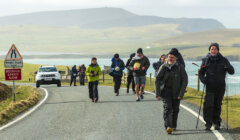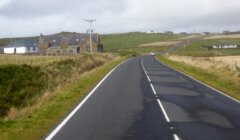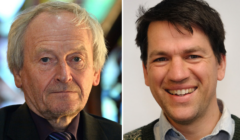Letters / Travelling under occupation
Fred Schlomka’s insights into the Israeli apartheid system (The Shetland Times, 24.2.2024) brought to mind the following: A traumatised young Swedish woman (one of a band of international humanitarian volunteers) talking about her witnessing the killing of an eight-year old Palestinian girl by an IDF soldier in the West Bank (no Hamas /no war).
It is a scene from a documentary shown in Shetland by Amnesty International (Kathy Hubbard was instrumental in this if I remember correctly) close on twenty years ago.
The late Babette Herchenröder, a German film maker, had responded to an internet appeal and decided to join the international volunteers. Their roles were straightforward – to stay for varying lengths of time with small Palestinian farmers (goat herders, olive growers) in isolated villages and remote areas of the West Bank.
The presence of these volunteers, and their strong ties to the international media, had proved an effective deterrent against attacks by Israeli settlers (more often than not aided by IDF soldiers). Such attacks involved destruction of crops and attempts to drive Palestinians out of their homes and from their land.
Alas, Babette got more than she’d bargained for – including putting her own life in danger through an attempt to deliver medicines to a remote village that had been cut off by the IDF bulldozing access roads.
Travelling under Occupation is a feature-length documentary chronicling her travels through Gaza and the West Bank during the 2003/04 winter. Both were Israeli occupied at the time.
I’m sure many such documentaries have been made before and since, but what makes her film unique is a complete lack of censorship or commentary. Some footage, such as filming at IDF check points, had to be done clandestinely in order to avoid confiscation of her camera and films.
After her film was edited and subtitled, she did something extraordinary and courageous: Not only did she show it to the Berlin branch of a Jewish women’s organisation, but filmed the reactions of her audience, which gave rise to a second documentary with the title: From this day onwards, I ceased to be a Zionist.
Many of the women she interviewed, including several Holocaust survivors, appalled by the brutality of the Israeli occupation, decided to side with the oppressed rather than the oppressors.
Twenty years ago, there was a clear distinction between anti-Zionism and anti-Semitism.
Since then, the parameters of acceptable political debate on the Israeli/Palestinian issue have been gradually narrowed until anti-Zionism and anti-Semitism have become one and the same.
This to my mind not only stifles debate, but actually dilutes and warps democratic expression and erodes the right to call out injustices and human rights abuses regardless of where in the world they happen and who perpetrates them.
If you should decide to support and protect those Palestinian peasants you now have to look over your shoulder and be fearful of being labelled an antisemite, and that is unacceptable.
Perhaps 2024 is good year to show this extraordinary film again in Shetland, if only to celebrate the 20th anniversary of its launch?
I’ve tried but failed to find Babette’s documentary with English subtitles (I have the Arabic/German version) and its follow-up film.
If anybody out there has copies or knows where to find them (Kathy Hubbard?) please contact me.
Rosa Steppanova
Cupar

















